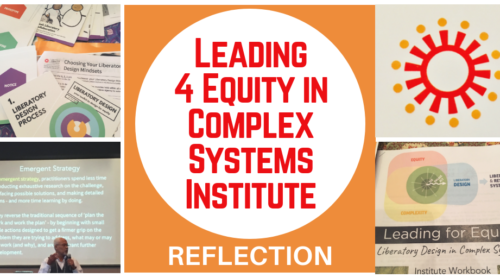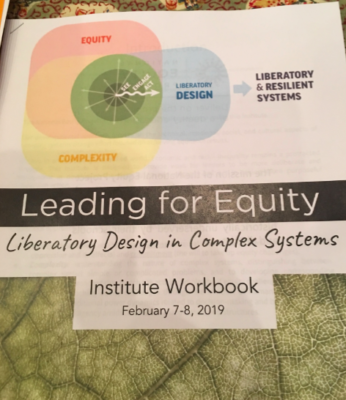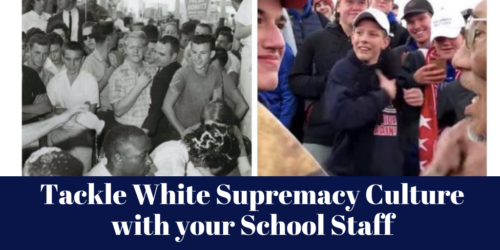Go to a National Equity Project Institute, It Might Change Yo Whole Life
Here are my reflections and major takeaways from attending the Leading for Equity in Complex Systems Institute led by the National Equity Project. In short, culturally responsive leaders can expect: Good folks, good ideas, and good for the soul.
Quick Run Dun
This was a 3-day institute, where we learned some new frameworks (see below), discussed, and planned some equity work to explore in our contexts. There was a great mixture of multimedia and modalities. Also, we were able to work in teams, independently, and remix our groupings. This training is especially effective for a team to attend. I rolled solo and I learned plenty. The handouts, resources, and visuals are professional and useful. Ok, let’s get into it.
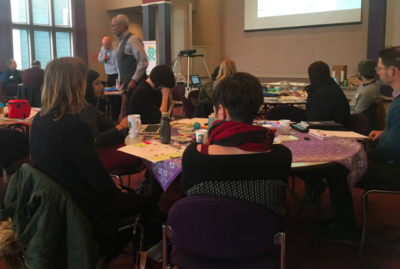
Good for the Soul: The Folks
I am convinced that a dope conference or training is like church for me. (here’s 7 other conferences for leaders) It’s spiritual and it feeds the soul. This is where I find my people, and see other folks engineering for equity. We know its hard enough to find folks who are philosophically aligned with you, let alone folks willing to take up the work or leading the change. Spaces, like this conference, are where my purpose is reactivated, recalibrated, and I’m reminded of my deep commitment to social justice in education.
This is where I get to connect with other conscious folk. There were people from Milwaukee, Houston, Chicago, Palo Alto, Oakland, Salinas, and San Francisco. We got to talk informally at tables, give feedback to our plans, and just build. I get a little fuel in the tank. Special shout out to John Heffernan, Principal from North Carolina. We were the only 2 principals there, and I learned so much from hearing about the racial equity work he is supporting at his site.
Good Examples: AAMA as a Case Study of Equity Work
We spent some time learning from the work of (now nationally recognized) Oakland Unified School District’s African American Male Achievement Program. A few years ago, African American males took up the equity challenge of supporting the crisis of black boys being pushed out of schools. High disciplinary actions and lower achievement (been working on this my whole life). They started by engaging the community in listening, learning, and seeing what could help. Leaders like Chris Chatman, Jahi, and Bayan tried out a few prototypes of a manhood development program. Through this process, they saw success and learned from their actions. It is showing successes and has expanded to other groups of color in Oakland, and AAMA in SF and Seattle. Here’s a trailer for the documentary about this lovely program.
Good Ideas: Cynefin Framework
Key Takeaway: This work is Complex and Complicated
We were introduced to the Cynefin (Cah-neh-fin) Framework, which breaks down problems into 3 categories, simple, complicated, complex, and chaos. Generally, we know that addressing equity dilemmas (discipline disproportionality for Black boys, low English proficiency for new immigrants) is hard or complicated. This usually drives leaders into finding the best answer, system, or plan to solve it.
But it ain’t so simple. It ain’t even always complicated.
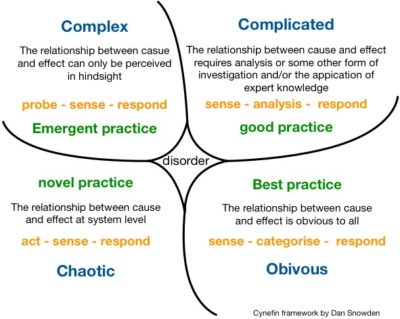
Instead, facilitators at the L4E Institute, pushed us to think about our equity problems as complex, meaning that there isn’t a clear answer. We don’t always know the answer so we can’t assume we know the perfect steps or the exact conditions. It’s going to be based on local context and politics. Further, we won’t know what works until after we start moving and we will have to adapt.
This lifts a weight off my shoulders of having to have all the answers as the leader and fairly complexifies the work. Early on, I thought there were simple things you could do like read books, go to a training, or shit, just be black. But it ain’t that easy. Later, I began to search for the formula like the perfect PD, an awesome scope and sequence, or master plan.
My experience has told me that it’s more complex, and my time with facilitators Victor Cary and Tom Malarkey, reminded me to slow down. I need to know that the work is cyclical and it must be driven by inquiry. We need to send our probes, gather intel, reflect, use an emergent practice. It’s about the questions, which makes me think of the 10 questions that keep me up at night.
Questions I am now Marinating on:
- How do we look better at the gap between values and actions?
- How do I situate anti-racism and liberatory work at the foundation of our work?
- How do we democratize decision making?
- How do students experience the effects of white supremacy culture?
- How does white supremacy culture and liberation show up in everyday practices and school policies?
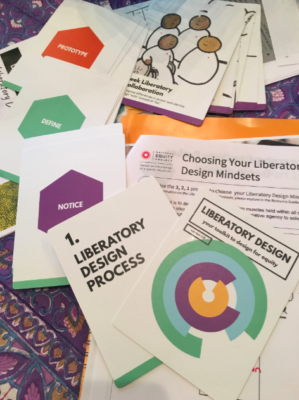
Good Resources: Liberatory Design Cards
These are sooooo dope. During day 3 of the institute, we got to use their new card deck. It combines innovation and design thinking (from Standford University’s dSchool) with…Equity.
These 2 should have hooked up a long time ago.
We got to use these with our own design challenge and I’m so glad that Harry met Sally because now we can ensure that we are working towards equity, using Liberatory pieces, while innovating. Kaboom. If you can’t attend this training, at least cop these cards. You won’t be disappointed. They are like Pokémon cards meets Paulo Freire. I actually used them to do some long term planning with my school’s teacher leaders. See agenda here. I might blog about this process in the future.
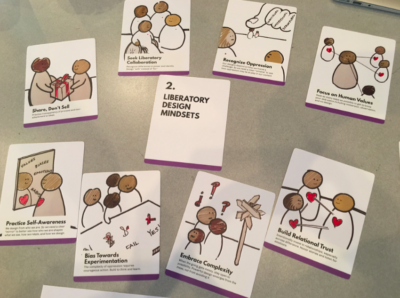
Conclusions and Major Takeaways
First, equity work is far more complicated than you think and the answers are not always so obvious. Even if you are a person of color (who should know a thing or 2 about race, it’s still complex) We might have some hunches but our context, team, and students should drive the direction we move in. Honestly, it’s ok that we don’t know the formula for success. Working on things like exploring White Supremacy Culture in Schools is not easy.
We know we need to figure it out, but we need to collaborate and talk through this work. Even if we don’t know the answers, we can pose some great questions. This work will only lead us towards more questions.
Questions are ok.
Because in our pursuit of answering these complex questions, we will get closer towards more equitable outcomes. Process, not product, but make sure your process is complex and guided by equity.
Why should you attend one of their trainings? 1) They have one of the sharpest equity lens around. 2) It’s a safe space for learning, especially for POC 3) They’ve been doing this for 20 years and they have learned a thing or 20.

